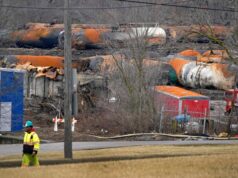
In 2016, the U.S. began exporting oil after hitting pause for 40 years. The increase in fracking and domestic energy production in part fueled that change, but the climate crisis is forcing Democratic candidates to weigh whether they’d reinstate that ban if they win the White House.
Leading presidential contenders like Senators Bernie Sanders and Elizabeth Warren have said they would bring the ban back. But self-proclaimed climate change guy Mike Bloomberg, however, would opt to continue exporting oil and gas to the world as president.
The presidential hopeful’s campaign told Reuters Friday that Bloomberg believes ending the exports would hurt the economy at little benefit to the planet. That’s because he expects players like Russia and Saudi Arabia to ramp up production and exports in response to renewing the ban.
The U.S. exported nearly 748 million barrels of crude oil in 2018. If the U.S. is going to be a world leader in addressing the climate crisis—as Bloomberg says he will position the country to be—it needs to put planet before profits. Reinstating the crude oil export ban could cut global carbon emissions by as much as 181 million tons a year, per a recent report from Oil Change International.
“Lifting the crude export ban has resulted in an out-of-control expansion of oil and gas production in the U.S. at precisely the time that we need to be ramping down fossil fuel extraction in order to achieve our climate goals,” David Turnbull, the strategic communications director for Oil Change U.S., wrote in an email to Earther. “Mike Bloomberg’s support for continued crude oil exports puts him out of step with the Democratic party and out of step with Democratic voters who time and again put the climate crisis towards the top of their issues of concern.”
In addition to Warren and Sanders, billionaire presidential candidate Tom Steyer has pledged to reinstate the ban if they win the nomination and the White House. Others like Vice President Joe Biden and Mayor Pete Buttigieg have stayed silent on the issue. Bloomberg is the only current candidate to specifically say he wouldn’t bring the ban back.
Bloomberg’s could be part of effort to attract voters in states where the oil and gas industry rules. Texas and Oklahoma are two of the states holding primaries on Super Tuesday, and they’re among the top 10 oil producers in the U.S. Texas sits at the top of that list.
Still, this is a state that’s seen firsthand the way climate change driven by fossil fuels can disrupt lives when Hurricane Harvey hit the Houston area in 2017. And voters are taking notice of the risks the crisis poses. A 2019 poll by Climate Nexus found that 63 percent of Democratic voters are worried about climate change. The tide may be turning in more liberal parts of Texas as well. Take TX-28, a Congressional district at the epicenter of the Texas fracking boom, where 26-year-old Jessica Cisneros is challenging incumbent Rep. Henry Cuellar in an extremely competitive race by running on a platform that endorses the Green New Deal. Meanwhile, Cuellar is one of 26 Democrats who voted to lift the export ban in 2015, and his anti-climate record could be a deciding factor in the race.
That’s the type of politics Bloomberg is attaching himself to, in addition to supporting more natural gas, something he signaled at last week’s debate. He is not tapping into the new energy focused on addressing the climate crisis coming into the party. Despite his past support of climate-focused organizations, his proposals just aren’t bold enough to solve the crisis.
“The expansion of fossil fuel production is putting our planet at risk, and rising crude oil exports are driving much of this production growth,” Tim Donaghy, Greenpeace USA senior research specialist, wrote in an email to Earther. “The next president will need to enact policies to drive investment away from fossil fuels and toward sustainable solutions. Building a future without fossil fuels and providing a just transition for workers and communities will reap benefits for the economy. What we can’t afford is to continue down the same path.”
Source: gizmodo.com








